

Virgin Trains. History[edit] Virgin Rail Group was awarded the InterCity West Coast franchise in January 1997 after beating Sea Containers and Stagecoach with operations commencing on 9 March 1997.[2] In October 1998 Virgin Group sold 49% of the shares in Virgin Rail Group to Stagecoach.[3] When Virgin won the franchise, Railtrack was to upgrade the West Coast Main Line to allow tilting trains to operate at 140 mph by 2005.
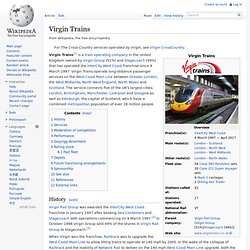
In the wake of the collapse of Railtrack and the inability of Network Rail to deliver on the 140 mph West Coast Main Line upgrade, both the Virgin CrossCountry and Virgin West Coast franchises were suspended in favour of management contracts in July 2002.[4] Due to costs having blown out from £2.5 billion to £10 billion there were cutbacks to the upgrade and the top speed reduced to 125 mph.[5] Services[edit] Standard Class aboard a Class 390 Pendolino First Class aboard a Class 390 Pendolino A map of Virgin Trains services showing the off-peak service pattern each hour. Structure of the rail industry in the United Kingdom. There are effectively two separate mainline railway systems in the United Kingdom - the Great Britain system and the Northern Ireland system, which are regulated operate separately and are constituted under separate pieces of legislation.
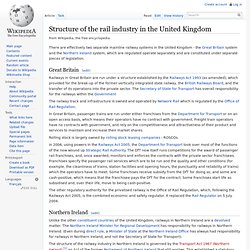
National Rail. In Great Britain, National Rail is the passenger rail service.
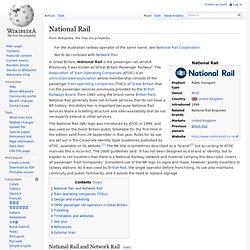
Previously it was known as"Great Britain Passenger Railway". The Association of Train Operating Companies (ATOC) is an unincorporated association whose membership consists of the passenger train operating companies (TOCs) of Great Britain that run the passenger services previously provided by the British Railways Board, from 1965 using the brand name British Rail). National Rail generally does not include services that do not have a BR history; this distinction is important because National Rail services share a ticketing structure and inter-availability that do not necessarily extend to other services.
Govia. NI Railways. NI Railways network History[edit] NIR was formed in 1968 when it took over from the Ulster Transport Authority (UTA), which had operated the province's railways since 1948.
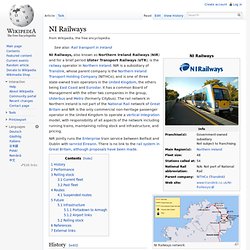
Much of the network closed during the 1950s and 1960s, declining from 900 miles (1,500 km) to 206.61 miles (330.58 km) at present. Suffering frequent disruption and damage to infrastructure caused by the Troubles and starved of investment by successive political administrations, the NIR network had become badly run down by the 1960s, with old rolling stock and poorly maintained track. NIR's last steam locomotives were withdrawn in 1970. As older trains became obsolete in the 1970s, the Class 80 slam-door diesel-electric multiple unit was introduced. Logo used from 1987 to 1996 NIR has three EMD class 111 locomotives, 111–113, for freight and passenger use, built in 1980 (111–112) and 1984 (113).
During the eighties it was apparent that additional trains would be needed. Performance[edit] Rolling stock[edit] Past fleet[edit] Serco Group. History[edit] Serco was founded in 1929 as a United Kingdom division of the Radio Corporation of America and initially provided services to the cinema industry.[4] It changed its name to Serco in 1987[4] and has been a London Stock Exchange listed company since 1988.[4] On 29 December 2008, Serco completed its acquisition of SI International.[5] Serco is one of the 55 contractors hired by United States Department of Health and Human Services to work on the HealthCare.gov web site.[6]
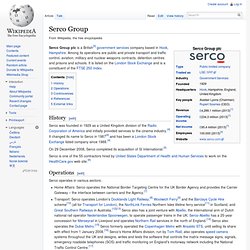
National Express Group. National Express Group plc (LSE: NEX) is a multinational public transport company headquartered in Birmingham that operates bus, coach, train and tram services in the United Kingdom, United States, Canada, Spain, Portugal and Morocco and long-distance coach services across Europe.
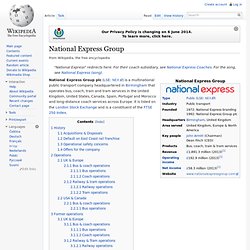
Eurostar International Limited. Eurostar International Limited (EIL) is the parent company of the Eurostar service operating between London, Paris and Brussels.
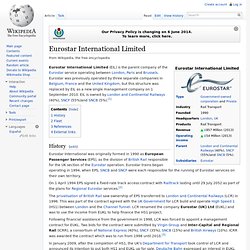
Eurostar was previously operated by three separate companies in Belgium, France and the United Kingdom, but this structure was replaced by EIL as a new single management company on 1 September 2010. EIL is owned by London and Continental Railways (40%), SNCF (55%)and SNCB (5%).[1] Serco-Abellio. Operations[edit] A Merseyrail train.
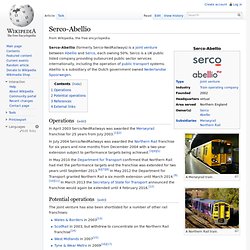
A Northern Rail train. Arriva UK Trains. Arriva UK Trains Limited[1] is the company that oversees Arriva's train operating companies in the United Kingdom.
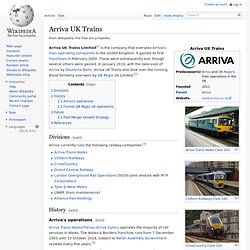
It gained its first franchises in February 2000. These were subsequently lost, though several others were gained. List of companies operating trains in the United Kingdom. Stagecoach Group. Stagecoach Group plc (LSE: SGC) is an international transport group operating buses, trains, trams, express coaches and ferries.
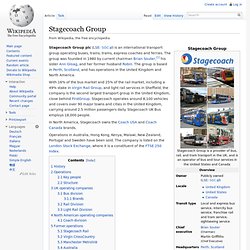
The group was founded in 1980 by current chairman Brian Souter,[1] his sister Ann Gloag, and her former husband Robin. The group is based in Perth, Scotland, and has operations in the United Kingdom and North America. With 16% of the bus market and 25% of the rail market, including a 49% stake in Virgin Rail Group, and light rail services in Sheffield, the company is the second largest transport group in the United Kingdom, close behind FirstGroup. Stagecoach operates around 8,100 vehicles and covers over 90 major towns and cities in the United Kingdom, carrying around 2.5 million passengers daily. Stagecoach UK Bus employs 18,000 people. In North America, Stagecoach owns the Coach USA and Coach Canada brands. Operations in Australia, Hong Kong, Kenya, Malawi, New Zealand, Portugal and Sweden have been sold. Heathrow Airport Holdings.
Heathrow Airport Holdings Limited, formerly BAA,[1] is the United Kingdom-based operator of London Heathrow Airport. The company was formed by the privatisation of the British Airports Authority as BAA plc, and was once a constituent of the FTSE 100 Index. The company was bought in 2006 and taken private by a consortium led by Ferrovial, a Spanish firm specialising in the design, construction, financing, operation and maintenance of transport, urban and services infrastructure. The company's head office is located in The Compass Centre on the grounds of London Heathrow Airport in the London Borough of Hillingdon.
The company makes money from charging landing fees to airlines and increasingly from ancillary operations within those airports such as retail and property. Virgin Trains.